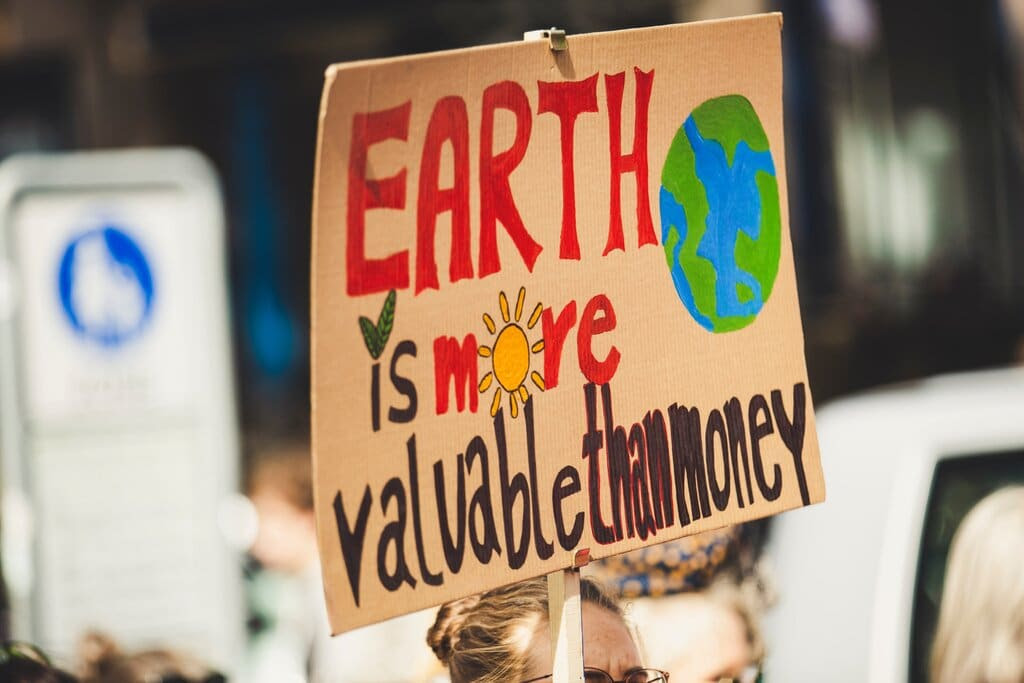
Reducing the impact of climate change may seem like a daunting task, but it doesn’t have to be. By aligning corporate interests with environmental policy, government leaders can lead the charge towards a healthier world and equip everyday citizens with the tools they need to make a difference, and to reduce our carbon footprint before it’s too late.
—
Climate change is one of the most pressing social issues in modern times, yet environmental policy efforts are often put on the back burner in favour of economic interests. As an example, consider US President Joe Biden’s 2022 State of the Union address: pro-environmental topics were conspicuously absent from the March 1 speech, save for a fleeting reference to corporate investments in the electric vehicle (EV) market.
Yet, America is far from the only culprit in terms of a lacklustre legislative response to environmental topics. Although governments around the world have the legislative power to spearhead climate action and implement environmental policies, many have turned a blind eye to the matter. Why? It’s primarily an issue of economics, as governments tend to prioritise the interests of corporate lobbyists over that of everyday citizens, or that of the natural world.
Interestingly, however, corporate interests and environmental policy continue to move ever closer to alignment as an increasing number of global citizens are concerned about sustainability, a mindset that’s reflected in individual spending habits. Consumer research conducted in nearly 30 countries determined that “the willingness to pay more for sustainable products is rising across geographies,” according to McKinsey senior partner Clarisse Magnin. Corporations in virtually every industry have used this information to their advantage, creating and marketing products that appeal to a sustainably-minded consumer set.
In terms of increased government and corporate interests in environmental policy, there’s also job growth to consider. Transitioning to renewable energy and investing in other sustainable practices is projected to create more jobs and foster economic growth among communities and corporations alike. Within Australia and elsewhere, the banking industry has already taken note, prioritising sustainable development in the name of protecting the Earth and improving financial wellbeing among citizens.
Let’s explore the relationship between governments and corporations when it comes to implementing environmental policies, and what can be done in order to create lasting change.
Where Economics and Environmental Policy Collide
The good news is that some government entities are eschewing the status quo, implementing forward-thinking policies to help mitigate the damage already caused by climate change. The state of California, for example, has set a lofty goal of a zero-emissions-only automotive sales market by 2035. This legislation is especially notable as California boasts one of the largest personal vehicle markets in the world, equating to a sizeable environmental return.
And the best part? Consumers don’t have to sacrifice style in the name of sustainability: Today’s new electric vehicles are sleek, sophisticated, and high-tech, ranking them among the coolest cars on the road. As early as 2024, consumers can expect to see upwards of 100 new EVs on the market, a sign that the production of zero-emissions vehicles has amped up in recent years.
As previously discussed, electric vehicle production is a big part of President Biden’s climate change agenda, and it’s easy to see why. Electric vehicles are projected to be a huge moneymaker for years to come, with their popularity fuelled by both rising consumer interest and laws designed to combat climate change. The increased demand for EVs around the world means that the EV charging infrastructure market is also on the rise, as more stations will be needed to keep up with increased power needs.
Research indicates that, if current trends continue, the global EV charging stations market may hit $111.90 billion in revenue by 2028. What’s more, countless jobs will be needed to keep up with the growing demand for EVs and the charging stations that power them. Charging station options range from barebone plug-in power to those with advanced features like smart metering and internet connectivity, with more technological advancements expected in the future.
Making a Difference Where It’s Needed Most
When discussing environmental policy, including what works and what doesn’t, it’s important to remember that climate change is also a social issue. For instance, low-income communities are adversely impacted by the negative effects of pollution, to the detriment of individual health and well-being. In order to better implement widespread sustainability efforts, policymakers must therefore start in the areas most impacted by pollution.
In the US for example, the most polluted US states owe the bulk of their sordid reputation to corporate interests, primarily in the industrial sector. Residents of Louisiana, for example, face an extremely high risk of numerous health conditions including cancer, asthma, and various respiratory diseases due to pollution exposure. State waterways have long contained large amounts of nitrates and other dangerous chemicals, and Louisiana’s air is among the nation’s most polluted. When present in drinking water, nitrates can have a detrimental impact on human health, and may cause cancer and birth defects.
Aligning Corporate Interests With Environmental Stewardship
Mitigating climate change is a job for every company and every citizen on Earth. As a voice for the people, government leaders should do their part to keep workers safe by prioritising environmental legislation rather than corporate interests. And they have plenty of tools available, reports the Center for Climate and Energy Solutions (C2ES), starting with a market-based approach that aims to balance financial interests with actionable solutions to climate change.
There’s no reason that corporate interests can’t coexist with sustainability, and from a public health standpoint, environmental stewardship makes a lot of sense. By protecting the Earth’s natural resources and waterways, humanity may just be able to breathe a little easier. Whether in the form of emissions reduction plans, single-use plastic bans, or community recycling regulations, it’s time to take real steps in the realm of environmental policy reform.







